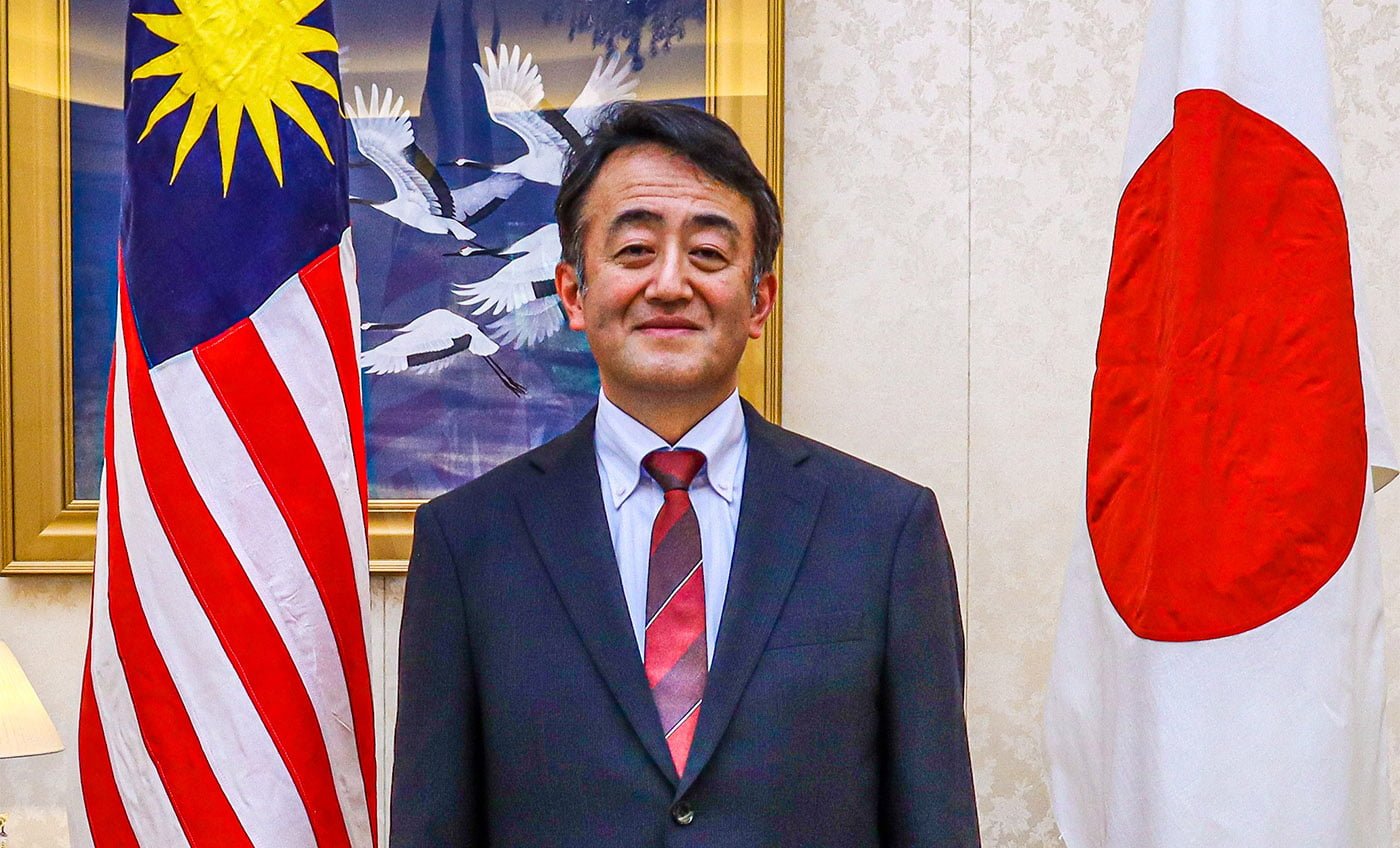Bridges spoke with Ambassador Takahashi Katsuhiko on the legacy of the ‘Look East Policy’ (LEP) and the new areas of opportunity between both countries.
Bridges: How has the LEP contributed to the growth of Malaysia as a nation?
Katsuhiko: The LEP has contributed to the Malaysian economy and 26,000 Malaysians have studied or trained under the LEP. They have become the foundation of bilateral relations and have contributed to the economic development of Malaysia.
Of the 27 Secretary Generals in Malaysian Ministries, thirteen of them studied and trained in Japan. This fact alone demonstrates Japan’s contribution to Malaysia’s ‘nation-building’. In business there has been a very good flow of people and investments between Japan and Malaysia over the past four decades.
So I’m really lucky to be in such a country. And of course, those students or trainees are active not only in the public sector but also in the private sector.
Consequently, having a lot of Japanese friends who are fluent in Japanese and within the Malaysian economy has created a strong synergy to introduce Japanese investment into Malaysia.
In the past 40 years, there has been a very good cycle of the flow of people and investment between Japan and Malaysia.
One of the objectives of the LEP was for Malaysia to learn from Japan, not only in technology, manufacturing or engineering but also working ethics and how to run companies in addition to Japanese language.
The LEP has contributed to the Malaysian economy and 26,000 Malaysians have studied or trained under the LEP. They have become the foundation of bilateral relations and have contributed to the economic development of Malaysia.
Japanese Ambassador to Malaysia Takahashi Katsuhiko

So it’s quite an easy place for Japanese company to operate. We have more than 1,500 Japanese companies operating in Malaysia which is a large number in comparison with other Southeast Asian countries with similar size populations and economic status.
And of course, Japan has tried to respond positively to the interest from the Malaysian side in other areas. For example, 10 years ago the Japanese government established an educational institution called the Malaysia Japan International Institute of Technology (MJIIT).
This is an Institute established with the support from the Japanese government and we provide financial support and the dispatch of experts amongst other things. As a result, now the graduates of MJIIT – those who studied Japanese style education in Malaysia – are now employed almost 100% by Malaysian companies and are playing a very important role in the Malaysian economy.
So those things are quite impressive. Therefore, Japan’s presence in the Malaysian economy continues to be very significant.
How extensive is Japan’s Foreign Direct Investment into Malaysia?
I came to Malaysia in November of last year and I was very much surprised to learn that even during the pandemic, Japanese investment to Malaysia didn’t decrease. Rather, it continued to increase. And I have a figure here that last calendar year the increase of our investment to Malaysia was 6.2b Ringgits (1.4b USD).
So our total accumulation of investment into Malaysia is now 82.7b Ringgits (18.5b USD).
In terms of trade, we are the fourth largest partner and the third largest for foreign direct investment and have created approximately 340,000 jobs in the manufacturing sector alone.
One of the objectives of the LEP was for Malaysia to learn from Japan, not only in technology, manufacturing or engineering but also working ethics and how to run companies in addition to Japanese language.
These figures demonstrate our positive presence in Malaysia and we see new areas of cooperation in which we can work together, particularly in Islamic Banking and the Halal food industry. I am eager to continue discussing these topics with my Malaysian counterparts and to strengthening the legacy of the country’s LEP.
Recently, Japanese companies started to invest not only on traditional sectors like but also in the services and this demonstrates that we are going up to the next stage of the bilateral relations in addition to traditional areas of investments in manufacturing.
How are both countries taking advantage of this celebratory year?
So this year is the 40th anniversary. Therefore, we really want to do whatever we can to highlight this 40th anniversary and encourage people to discuss what else we can do moving forward.
So the latest example is a visit of Prime Minister Dato’ Sri Ismail Sabri bin Yaakob to Japan. We are really happy that he visited Japan on the occasion of the 27th International Conference “Future of Asia’ hosted by Nikkei Shimbun.
He visited from the 23rd of May until the 28th which is quite a long stay for the Prime Minister. What is also noteworthy is that five ministers accompanied the Prime Minister. Just for your information he visited the United States before coming to Japan and only three ministers accompanied him.
This is also important thing I need to point out. Those ministers are from the Minister of International Trade and Industry, Foreign affairs, Youth and Sports, Human resources and the Federal Territories. Each Minister had a productive conversation with his counterpart minister in Japan.
In the meeting of the two Prime Ministers we promoted bilateral relations further on the occasion of the 40th years anniversary of The LEP and also the 65th anniversary of the establishment of diplomatic relations between the two countries. We both agreed that we need to put new elements into The LEP.
We signed three memorandums of cooperation related to specified skill workers, youth and sports exchange and development of the aircraft industry. These are all future areas of expansion in The LEP.
In the meeting of the two Prime Ministers we promoted bilateral relations further on the occasion of the 40th years anniversary of The LEP and also the 65th anniversary of the establishment of diplomatic relations between the two countries.
Prime Minister Fumio Kishida has been promoting his vision for an ‘Asia zero-emissions community’ and Prime Minister Ismail Sabri expressed his full support to his vision. So this is also one of the highlights, which I wanted to do mention.
Also, when Minister of Economy, Trade and Industry (METI) Mr. Koichi Haguida met with Malaysian MITI Minister Azmin Ali, they agreed to begin the ‘Industrial Policy Dialogue’, which involves both private and public sector to discuss supply chains and high-end industries.
Also, another thing I want to mention on the bilateral topic is the opening of the branch of Tsukuba University in Malaysia. This has been a long-standing issue for the past few years and now we are going to open the first Japanese university branch abroad. We have some issues but we received a very strong commitment from Prime Minister Ismail Sabri, that he himself will push very strongly that this project comes to fruition.
These are some of the highlights Prime Minister Ismail Sabri visit to Japan and I think those achievements really give us a sense of the direction where we need to go.
We are still in the middle of 40th anniversary of The LEP, therefore, we will continue to have discussions for the next five months on how we can consolidate the direction of The LEP for decades to come.
What is the position of both countries concerning geo-political issues affecting the World and within Asia?
Concerning international issues taking place in Europe and the Pacific, what is important is that both Prime Ministers in their dialogue confirmed that aggression against one country is unacceptable and concurred to work together to deal with the impact on the global economy and how to improve the humanitarian situation.
We are still in the middle of 40th anniversary of The LEP, therefore, we will continue to have discussions for the next five months on how we can consolidate the direction of The LEP for decades to come.
In the South China Sea, we confirm the importance of maintaining and strengthening the free and open international border, which has been one of the important topics we have been promoting.
What can we expect from the expansion of the ‘Look East Policy’ in the next decade?
One of the pressing issues is the importance of supply chains. Disruptions due to COVID-19 and what is happening in Ukraine really made us aware of the importance of supply chains and how it affects every industry so there is an opportunity to work together to make it more resilient.
Disaster risk reduction is one of the key areas where we need to cooperate in. Malaysia is very aware that Japan has a lot of expertise to offer so we want to highlight this aspect.
Climate change is one of the topics the two leaders discussed and there are already a lot of projects going on between the private sectors of Japan and Malaysia but within the Government of Japan, we also want to implement a ‘Joint Crediting Mechanism’ system which our government has been arranging with some other countries.
If we can agree on this mechanism with the Malaysian Government, we will be able to provide more government financial resources to support Malaysia.
Therefore, we are going to encourage the Malaysian side to commence a dialogue on how we can set up this mechanism. They are currently preparing their strategies for this system so we need to wait a little bit but we will continue to advocate this.
Another area is the digital area. Prime Minister Ismail Sabri also emphasized the importance of digital in the new area and this is an area where we have expertise in.
In my view, the future of the LEP shouldn’t be about a donor recipient relation which was the typical way of thinking. Malaysia as a nation has developed to a higher level so now is the time for us to think about more partnerships, how we can learn together or what Japan can learn from Malaysia.
In my view, the future of the LEP shouldn’t be about a donor recipient relation which was the typical way of thinking. Malaysia as a nation has developed to a higher level so now is the time for us to think about more partnerships, how we can learn together or what Japan can learn from Malaysia.
From this point of view, I really want to put emphasis on Malaysia’s unique position especially in terms of Islam in society. Malaysia is a front runner on Islamic banking and also they are the front runner in the Halal food industry and these are areas where Japanese companies can learn from and what I want to emphasize.
Also on trade in general, we are expecting the ratification of The Comprehensive and Progressive Agreement for Trans-Pacific Partnership (CPTPP) by Malaysia as soon as possible.
The recent framework called the Indo-Pacific Economic Framework for Prosperity (IPEF), which Japan and Malaysia became members in can also be another element to facilitate trade and investment between the two countries.
I firmly believe there are a lot of positive elements and areas of cooperation where we can work together in and I look forward to continue discussing these topics with my Malaysian counterparts.



